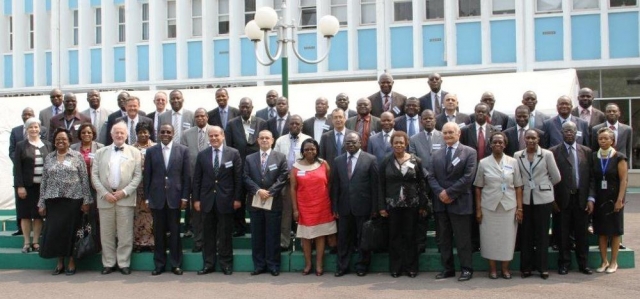Experts discuss improvement of Medical Education and Training in Africa
 Brazzaville, 9 July 2014 – A three-day Regional Consultation on Medical Education and Training got underway today (Wednesday) in Brazzaville Congo. Organized by the World Health Organization (WHO), the meeting is discussing how the quality and relevance of medical education and training can be improved in the African Region.
Brazzaville, 9 July 2014 – A three-day Regional Consultation on Medical Education and Training got underway today (Wednesday) in Brazzaville Congo. Organized by the World Health Organization (WHO), the meeting is discussing how the quality and relevance of medical education and training can be improved in the African Region.
Addressing the delegates, the WHO Regional Director for Africa, Dr Luis Sambo, pointed out that progress made by some countries in the Region towards achieving the Millennium Devel-opment Goals (MDGs) was being constrained by health systems challenges including the shortage of well-trained health workers.
Although Sub-Saharan Africa has 24% of the global burden of disease, it has only 3% of the world's health workers. While the need for health care in the Region has increased, the availa-bility of health workers either stagnated or declined. “Of the 47 countries in the WHO African Region, 22% are actually having a declining density of core health worker namely doctors, nurses and midwives”, said Dr Sambo.
The Regional Director called on delegates to come forward with concrete suggestions on how best to scale up the quantity and quality of Africa's medical graduates taking into account Africa's unique epidemiological context, public health threats, and underlying cultural, social and economic determinants. He said: “A key challenge that I hope we can start to address with practical suggestions is the professional development, motivation and retention of medical educators and trainers in Africa”.
Speaking to reporters, Professor David Gordon, President of the World Federation of Medical Education (WFME) said: “I think the solution is very much an economic and political one as well as academic. It requires national governments and local authorities as well, to recognize that strong health care education in all relevant disciples and not only in medicine is very important for the social and economic development of the entire continent”.
He pointed out that countries need to balance socio-economic development with the develop-ment of high quality medical education. He drew attention to the role of the World Federation of Medical Education in promoting the highest standards in medical education across the world.
In her remarks, Dr Margaret Mungherera, President of the World Medical Association (WMA) disclosed that the body had embarked on a five-year capacity building programme for African national medical associations to enable them play a more effective role in strengthening national health systems.
Referring to the quality of medical education, she said: “The responsibility of ensuring that medical education is of the highest possible standards must be shared however, between the profession, training institutions and the government. And all doctors have a responsibility to themselves, the profession and their patients to obtain medical education that is of the highest possible standard”.
Dr Mungherera noted that the clinical component of medical education should not be restricted to biological and behavioral sciences but must also address the socio-economics of health care. In addition, there should be firm grounding in the ethical and human rights principles and research methodology. She also stressed the importance selecting trainees for medical education on the basis of not only on intellectual abilities but also on motivation, character and integrity.
The meeting, which is being attended by representatives of the World Federation of Medical Education (WFME), Conseil africain et malgache pour l'enseignement supérieur (CAMES) and Deans of medical schools from a number of African and European universities, among others, ends on Friday.
______________________________________________
For further information contact:
Dr Djona Avocksouma Tel: +4724139174 Email: Avocksoumad [at] who.int (Avocksoumad[at]who[dot]int)
C. Boakye-Agyemang Tel: +4724139174 Email: boakyeagyemangc [at] who.int (boakyeagyemangc[at]who[dot]int)
Samuel Ajibola Tel: +4724139174 Email: Ajibolas [at] who.int (Ajibolas[at]who[dot]int)


